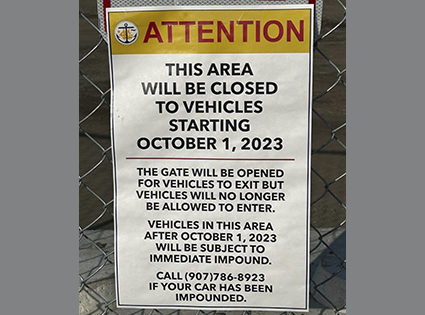Bronson Administration to Abate Camps, Pivot to Smaller Shelters for Cold Weather Housing
With Mayor Dave Bronson’s proposed mass shelter on Tudor and Elmore off the table, his administration has pivoted to supporting non-congregate housing and smaller shelters, a strategy for solving homelessness that the Anchorage Assembly has advocated for years.
Bronson’s housing and homelessness coordinator, Alexis Johnson, presented details of the cold weather sheltering plan to the Assembly on Friday. The administration is striving to have three cold weather shelter locations up and running by Oct. 16, including the recently vacated Solid Waste Services administration building, which they plan to use as a 150-bed congregate shelter. There are also 372 beds expected to be available in two non-congregate shelters, though Johnson did not disclose the locations. Assembly approval will be required for these parts of the plan. Family cold weather sheltering, run by Christian Health Associates, started operating Sunday. Johnson presented a slide show of the SWS administration building. The building has a secured entry, offices for intake and navigation services, congregate shelter space, showers, lockers, two kitchens for heating personal food items and making hot drinks, large spaces for a separate dining area and day use space, and a large fenced outdoor recreation area. The building became available when SWS moved its administrative offices to a new building located nearby. “We’ve had a number of outside entities and nonprofits that are interested in having an office onsite,” Johnson said. “I really think that we have a great opportunity here.” The administration is currently working on cleaning and repairs of about $150,000 to upgrade the fire system and make the building operational for use as a shelter. The cost to lease the building is not yet finalized, but Johnson said that she expects the lease to run less than $15,000 per month. The now defunct Tudor and Elmore mass shelter was expected to cost between $15 million and $20 million to finish. Assembly member Karen Bronga, who spent time vetting the SWS facility, said that she was very excited about the building. “It’s so close to everything we were looking for in a shelter, without building one from scratch,” Bronga said. She was especially excited about the day use space, which she said has offices around it that would be great for engagement with navigation services and is “perfect for hanging out, group activities and building community.” During the meeting, Johnson pointed to one measure of success realized by the Housing First model long supported by the Assembly. With more housing choices — including Complex Care, the Lakeshore, The Barratt Inn and the Golden Lion — 40% fewer people are seeking cold weather shelter in Anchorage this winter as compared to last year. “It’s amazing; that means we are housing people,” said Assembly member Christopher Constant. Johnson said that the administration is currently working to match clients with the facility that best meets their needs. Outreach is focused on the four largest homeless encampments: Cuddy Park; Davis Park; Chanshtnu Muldoon Park, and the large camp at 3rd Avenue and Ingra Street. The administration plans to abate two of the camps, at 3rd Avenue and Chanshtnu Muldoon Park, as new shelter space opens up. “It’s our goal to get 3rd and Ingra posted and closed and to move all clients into sheltering and housing as the shelter beds are available,” Johnson said. The administration started the process by closing the 3rd Avenue camp to vehicles. Signage placed last week informs campers that their vehicles became subject to impound after Oct. 1. This includes many vehicles currently used for habitation, including older campers and vans, buses, and other converted vehicles. Due to the difficulty of maintaining the washing stations and toilets in cold weather, they were removed on Oct. 16 by the vendor who supplied them. The administration intends to proceed with complete abatement of the camp between Oct. 16 and 26, before turning their attention to Chanshtnu Muldoon Park. Johnson said that the administration would like to run the cold weather shelters through the end April of next year, with a possible extension of the SWS facility for vulnerable populations beyond that. This year, operations at the Sullivan Arena ended for most clients on May 1, sending Anchorage’s unhoused out into parks and large encampments located throughout town for the summer. |
